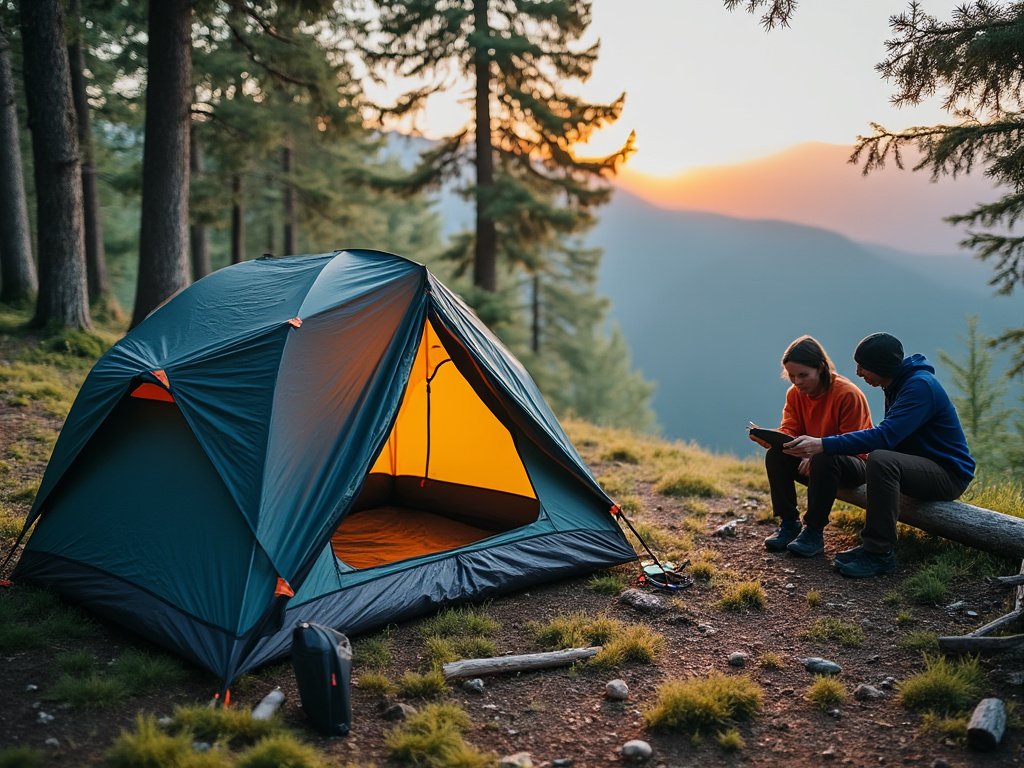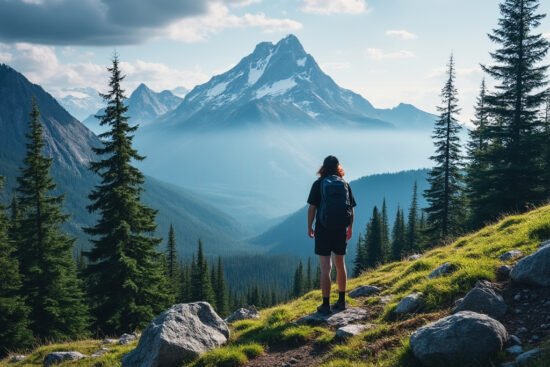
Ultralight backpacking is more than just a trend in outdoor pursuits; it's a philosophy that challenges conventional wisdom about what we need to enjoy and survive in nature. By dramatically reducing pack weight, ultralight enthusiasts aim to enhance their outdoor experiences through minimalism. But the benefits of this approach extend far beyond the physical realm of lighter loads and faster miles. The psychological impact of embracing ultralight principles can be transformative, offering a new perspective on our relationship with possessions, nature, and ourselves.
The Mindset Shift
From “Just in Case” to “Just Enough”
The journey to ultralight begins with a fundamental shift in thinking. Traditional backpacking often emphasizes preparedness for every conceivable scenario, leading to overloaded packs and unnecessary stress. Ultralight philosophy challenges this “just in case” mentality, encouraging hikers to carry only what is essential for their journey.
This transition requires a deep examination of one's true needs and a willingness to let go of items that provide more psychological comfort than practical use. It's about trusting in one's ability to adapt and problem-solve with limited resources, rather than relying on an extensive array of gear.
Overcoming Fears and Uncertainties
One of the biggest hurdles in adopting an ultralight approach is confronting the fears and uncertainties associated with carrying less. What if there's an emergency? What if the weather turns unexpectedly? These concerns are valid but often overblown.
Experienced ultralight backpackers emphasize the importance of skill development over gear accumulation. By honing wilderness skills and gaining confidence in one's abilities, the perceived risks of carrying less diminish. This process of facing and overcoming fears can be incredibly empowering, extending its benefits far beyond the trail.
Developing Trust in Oneself and Gear
As ultralight hikers pare down their kit, they develop a deeper trust in both their gear and themselves. Each item in an ultralight pack serves a crucial purpose and is often thoroughly tested and relied upon. This focused approach to gear selection fosters a sense of confidence and self-reliance.
Moreover, the process of carefully choosing and trusting in minimal gear translates to increased trust in one's own judgment and abilities. Ultralight backpackers often report feeling more capable and self-assured, both on and off the trail.
Mental Benefits of Ultralight Backpacking
Reduced Cognitive Load and Decision Fatigue
One of the most immediate psychological benefits of going ultralight is the reduction in cognitive load. With fewer items to manage, organize, and worry about, hikers can free up mental energy for more meaningful aspects of their journey. This decrease in “decision fatigue” — the deterioration of decision-making quality after a long series of choices — can lead to clearer thinking and more enjoyment of the hiking experience.
Increased Focus on the Present Moment
With less physical and mental clutter, ultralight backpackers often find it easier to immerse themselves in their surroundings. The simplicity of their setup allows for greater mindfulness and appreciation of the natural world. Many report a heightened sense of presence and connection to their environment, unencumbered by the distractions of excessive gear.
Enhanced Sense of Freedom and Mobility
The physical lightness of an ultralight pack translates to a psychological sense of freedom. Hikers feel less tethered to their possessions and more able to move freely through the landscape. This increased mobility can lead to a greater sense of adventure and spontaneity, allowing for detours, side trips, and impromptu explorations that might be bypassed with a heavier load.
Minimalism Beyond the Trail
Translating Ultralight Principles to Everyday Life
Many ultralight backpackers find that the principles they apply on the trail begin to influence their daily lives. The critical evaluation of needs versus wants, the appreciation for quality over quantity, and the focus on experiences rather than possessions can lead to a more minimalist lifestyle overall.
Decluttering Physical and Mental Spaces
The process of streamlining a backpack often inspires similar efforts at home. Ultralight enthusiasts frequently report decluttering their living spaces, digital environments, and even their schedules. This physical decluttering often leads to mental clarity and reduced stress in everyday life.
Prioritizing Experiences Over Possessions
Perhaps one of the most profound impacts of ultralight philosophy is the shift towards valuing experiences over material possessions. By recognizing how little one needs to have a fulfilling outdoor adventure, many people begin to question their consumption habits and focus more on creating meaningful experiences in all aspects of life.
Challenges and Potential Pitfalls
Balancing Minimalism with Safety and Comfort
While the benefits of ultralight backpacking are numerous, it's crucial to strike a balance between minimalism and necessary safety precautions. Experienced ultralight hikers emphasize the importance of carrying essential safety gear and not compromising on items that are truly needed for a particular environment or trip duration.
Avoiding the Trap of Gear Obsession
Ironically, the pursuit of ultralight gear can sometimes lead to its own form of materialism. The constant search for the lightest and most efficient equipment can become an obsession, contradicting the minimalist principles at the core of the ultralight philosophy. It's important for hikers to remain mindful of this tendency and focus on the experience rather than the gear itself.
Dealing with Societal Pressure and Expectations
Ultralight backpackers often face skepticism or concern from friends, family, or fellow hikers who are accustomed to more traditional backpacking methods. Dealing with these external pressures requires confidence in one's choices and the ability to educate others about the benefits and safety considerations of the ultralight approach.
The Connection to Nature
Deepening Relationships with the Environment
Carrying less allows for a more intimate connection with the natural world. Without the barrier of excessive gear, ultralight hikers often report feeling more attuned to their surroundings, from the texture of the ground beneath their feet to the subtle changes in weather and wildlife behavior.
Reduced Physical Impact
The ultralight philosophy aligns well with Leave No Trace principles. Lighter packs mean less erosion on trails, smaller campsites, and generally reduced impact on the environment. This can lead to a sense of stewardship and increased environmental awareness among ultralight practitioners.
Heightened Awareness of Natural Surroundings
With fewer distractions and a lighter load, ultralight backpackers often develop a keener sense of observation. Many report noticing details in the landscape, flora, and fauna that they might have missed when burdened by heavier packs and more complex camp setups.
Psychological Techniques for Embracing Ultralight
Mindfulness and Meditation Practices
Incorporating mindfulness and meditation into the hiking experience can enhance the psychological benefits of ultralight backpacking. Simple practices like mindful breathing while walking or taking moments to fully observe one's surroundings can deepen the sense of presence and connection to nature.
Cognitive Reframing of “Needs” vs. “Wants”
A key psychological technique in adopting ultralight principles is the conscious reframing of perceived needs. This involves questioning assumptions about what is truly necessary for comfort and safety, and being willing to experiment with doing without certain items.
Gradual Progression Towards a Lighter Pack
For many, the transition to ultralight is a gradual process. Starting with small reductions in pack weight and progressively leaving behind more items as confidence grows can make the psychological adjustment easier and more sustainable.
The Role of Community
Learning from Experienced Ultralight Hikers
The ultralight community is known for its willingness to share knowledge and experiences. Engaging with experienced ultralight backpackers, whether online or in person, can provide valuable insights, boost confidence, and offer solutions to common challenges.
Sharing Knowledge and Supporting Others
As hikers gain experience with ultralight techniques, many find satisfaction in sharing their knowledge with others. This sense of community and mutual support can be a significant source of motivation and psychological reinforcement.
Building Confidence Through Group Experiences
Participating in group hikes or workshops focused on ultralight techniques can be an excellent way to build confidence and overcome initial hesitations. Seeing others successfully implement ultralight principles can be inspiring and reassuring for those new to the approach.
Embracing the Ultralight Mindset: A Path to Freedom, Self-Discovery, and Deep Nature Connection
The psychology of going ultralight extends far beyond the simple act of carrying less weight. It represents a fundamental shift in how we approach not just backpacking, but our relationship with possessions, nature, and ourselves. By embracing minimalism on the trail, hikers often discover a newfound sense of freedom, presence, and self-reliance.
The benefits of this approach — reduced mental clutter, increased mindfulness, and a deeper connection to the natural world — can have profound and lasting impacts on one's overall well-being. While the ultralight journey comes with its challenges, the potential for personal growth and transformation makes it a compelling path for many outdoor enthusiasts.
As we navigate an increasingly complex and materially-oriented world, the principles of ultralight backpacking offer a refreshing alternative. They remind us that often, less truly is more, and that our most profound experiences in nature — and in life — come not from what we carry on our backs, but from our willingness to engage fully with the world around us.
Whether you're a seasoned backpacker looking to lighten your load or someone seeking a new perspective on outdoor adventures, the ultralight approach offers a unique opportunity to challenge yourself, simplify your experiences, and potentially discover a new way of moving through both the wilderness and the world.








